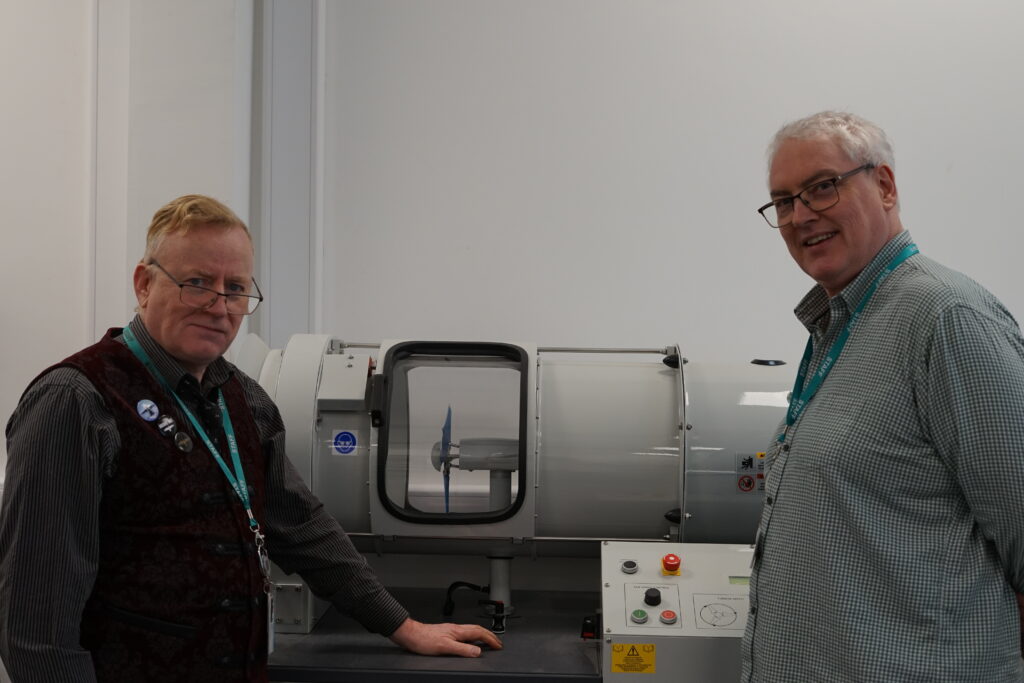
John Barker and Dr Steve Wright
Sustainability is no longer just an idealistic goal – it’s a necessity. The Lancashire and Cumbria Institute of Technology (IoT), in partnership with Nelson and Colne College Group (NCCG), is at the forefront of this movement, actively investing in renewable energy, sustainability-focused education, and innovative solutions to reduce carbon footprints across industries.
NCCG is spearheading an £8 million renewable energy project that aims to optimise energy use across its Nelson and Accrington campuses. By leveraging solar power and ground source heat pumps, the college is on track to becoming 90 per cent self-sufficient in energy. Once fully optimised, the sites will be net carbon zero by balancing production and consumption using battery storage.
Director of Estates and Sustainability at Nelson and Colne College Group (NCCG), John Horsfield is closely monitoring data and efficiencies to support this transition.
Dr Steven Wright, Director of Academic Standards at NCCG, said: “Sustainability permeates the curriculum. Both engineering and construction courses incorporate sustainability principles, ensuring students develop eco-conscious problem-solving skills.
“The College teaches students about green technology and its real-world applications. The real impact lies in understanding which solutions work best in each scenario. It requires someone to ask the right questions.”
Every business has an environmental footprint, and NCCG is equipping students with the skills to help companies reduce theirs.
Steve said: “The sustainable technology courses can easily be applied to the manufacturing industry – and there’s a lot of manufacturing businesses in Lancashire.
“We look at the materials, processes, and product lifecycle. For example, growing tomatoes in Britain versus flying them from Spain may seem straightforward, but for most of the year, Spanish tomatoes have a lower carbon footprint due to energy-intensive greenhouse heating in the UK. Everything is nuanced.
“It’s about weighing environmental and financial factors to make the best decision for each business. Many companies are unsure of their next steps, but soon they’ll realise they need expertise in balancing these trade-offs.”
He has been approached by a local council evaluating the feasibility of electric bin collection services, which requires expert knowledge on sustainable transport.
As part of the IoT, NCCG has collaborated with experts to create industry-relevant courses. The sustainability curriculum, developed by four leading university professors and tested on businesses, will launch for students in September.
At Nelson and Colne College Group, students explore real-world applications of green energy solutions such as solar energy, heat pumps, and town planning for efficient infrastructure. One of 12 core engineering modules in year one focuses on environmental responsibility, helping students integrate sustainability into their future professions.
Short courses are also available to upskill and reskill employees, offered full-time, part-time, in intensive bursts, or evening sessions depending on industry needs.
Steve said: “I really want to see this course become a huge success because that means it will be working for industry around us, and that is what matters most to us.”
The course offers:
Steve said: “Sustainability isn’t just an academic exercise. It’s a strategic investment for businesses, communities, and individuals.
“NCCG and the IoT are ensuring that the next generation of engineers, planners, and business leaders are equipped with the knowledge and skills needed to make meaningful change.”
Employers looking to future-proof their businesses should consider partnering with NCCG, enrolling employees in sustainability modules, or exploring how sustainable practices can benefit their bottom line. With courses launching this September, now is the time to take action and be part of the green revolution.